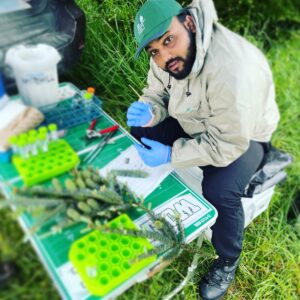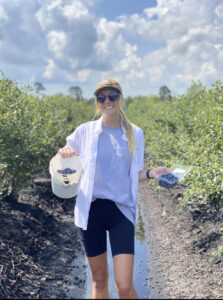Graduate Student Spotlights
Graduate Student Spotlights
 Adarsha Devihalli
Adarsha Devihalli
- PhD Candidate
- Lab: Dr. Justin Whitehill
Among various locations and programs to choose for his doctoral study, Adarsha joined NCSU due to the importance he saw faculty give to agricultural research, especially in the from of outreach and extension. Valuing the importance of extension, community outreach, and the social good science can provide is rooted in Adarsha’s research and childhood in India. As he states “I’m interested in understanding the plant pathogens that cause severe economic loss to growers. My focus is to study the plant-pathogen interaction at the molecular level. I use modern biotechnology and genomic tool for my study…I grew up in the hill stations of southwestern India with diverse crops and trees around. Answering questions and finding solutions to problems in the field have always fascinated me. I always like to question the way of biological processes and answer them with scientific tools. My bachelor’s in agriculture science and master’s in biotechnology gave me the confidence that I can pursue my goal of a Ph.D. dealing with plant-pathogen interactions.”
Investigating the molecular mechanisms of Phytophthora infection in Fraser fir, Adarsha gave a presentation at CNR graduate symposium 2022. The following is his abstract for that presentation:
Fraser fir (Abies fraseri) is the foremost Christmas tree species that is sold in the U.S. Fraser fir accounts for 38% of all the species marketed in the country. Fraser fir is endemic to the Southern Appalachian Mountains of NC. Christmas trees contribute ~$125 – 250 million USD to NC’s economy every year. The NC State University Christmas Tree Genetics program primary objective is to support NC farmers with genetically improved elite Fraser fir germplasm. Phytophthora root rot (PRR) caused by the pathogen Phytophthora cinnamomi is the most significant problem of Christmas tree plantations in NC and kills 100% of all trees it comes into contact. Losses of Fraser fir in NC due to PRR infection are estimated to account for 9% of all annual production which results in millions of dollars in lost revenue. To develop genetic strategies in Fraser fir that can better resist or survive in the presence of PRR requires a deeper understanding of the molecular mechanisms involved in PRR infection of Fraser fir. A more detailed understanding of the interaction between tree and pathogen will help in the identification of putative pathogenicity-associated genes and associated resistance genes or traits in Fraser fir or other Abies spp. that have natural resistance to this devastating disease. Ultimately, the goal of my research is to develop genetic strategies for Fraser fir to help Christmas tree farmers better manage PRR in a field setting. I plan to apply the modern genomics and biotechnology toolkits to achieve this primary objective. My current research activities are focused on sequencing the genome of a specific strain of P. cinnamomi that is also highly aggressive against Fraser fir. Also, I am actively working to develop a GFP expressing strain of P. cinnamomi that I plan to use to better understanding how the pathogen infects and kills its host. Finally, I am using novel somatic embryogenic and tissue culture techniques with Fraser fir to expedite my mechanistic studies.
Aldo Carmona-Baez
- PhD Candidate
- Lab: Dr. Reade Roberts
The NC State Genetics Program appealed to Aldo because of its course structure and research opportunities available. He preferred the expansive curriculum, immersing students in all areas of genetics, such as molecular, developmental, and quantitative genetics. He knew that choosing NC State meant being a part of a diverse scientific community with endless research possibilities, one where he ultimately decided to focus on evolutionary genetics research projects. Nearing the end of his time as he finishes his dissertation, Aldo commends the program for being integrative. In addition to learning from faculty who are passionate experts in their fields, he emphasizes the value of his experiences outside the classroom. “I can compliment my academic training by attending seminars and interacting with [people] from other programs, such as the Toxicology Program and the Bioinformatics Research Center.” He continues, “I have had the opportunity gain teaching experience and be in contact with the industry [partners] around the Triangle area.”
Aside from academics and professional development, Aldo thinks highlighting the strong sense of community within the program is also important. All of the graduate students work together through the Genetics Graduate Student Association (GGSA) to coordinate social events, play on intramural sports teams, plan symposiums, and assist with the program’s recruitment and outreach. Through all of this, the Genetics Program at NC State offers its students a uniquely comprehensive graduate school experience.Aldo’s main research interests in the program include evolutionary genetics, genomics, and bioinformatics.He has participated in poster presentations at several events, including the NCSU Latin American Symposium and the Triangle Zebrafish Symposium. He has also given talks at Genetics events including the 9th Annual Fall Genetics Program Retreat titled, The genetic basis of gut length divergence across trophic levels in cichlid fishes. His abstract can be read below:
Trophic specialization is key to the phenotypic and species diversity observed across life. Several characteristics of gut morphology and physiology correlate with trophic levels. The most common example of these correlations is found in vertebrates, where organisms with a plant-based diet generally have longer digestive tracts compared to animals at higher trophic levels. Despite its importance, very few studies have explored the genetic basis of diet adaptation. In this study, we used recently diverged Malawi cichlid species as a model to identify candidate genes involved in gut length variation with a forward genetics approach. We performed QTL mapping of gut length on an F2 mapping population from a hybrid cross between carnivorous and omnivorous species of cichlids, and identified QTL contributing to variation in gut length. This analysis represents the first identification of naturally evolved, adaptive genetic variants associated with gut length. We are now integrating these mapping results with comparative genomic and transcriptomic studies to pinpoint the genes and gene networks driving evolution of the gut.
Felicia Shepard
PhD Candidate
Lab: Dr. Hamid Ashrafi
Felicia decided that she would stay here at NCSU following the completion of her bachelors degree, after getting a front row seat to see how passionate the faculty here at NCSU are for both their students and research. NCSU being known and revered for its programs being rooted in agriculture didn’t hurt either. She wanted to pursue graduation education so she could “expand my skills in the physical, microbiological, and chemical makeup of plants and food to better my community and the field of science and agriculture. Growing up, I developed a passion for cooking which led me to educate myself on hunger and food insecurity in the world. This ultimately brought me to my current research, which I hope can play a role in increasing the sustainability of agriculture.” The desire to take research and use it to benefit broader society matches NCSU values well.
As a graduate student in the Genetics program, Felicia has had her appreciation of all areas of science grow. The seminars, talks, and seeing the progress of her peers and colleagues has been one her most loved aspects of being a graduate student. Likewise she has found a powerful sense of comradery and support from the broader Graduate School community. That support has followed and nourished her since she was an undergrad lab assistant in Dr. Lina Quesada’s Plant Pathology lab. There, Felicia’s “love of plant science was born. Over the next three years, I became heavily involved in the biotechnology department at NCSU and discovered plant breeding, a field that combined all of my interests thus far. I was encouraged by my current PI, Dr. Hamid Ashrafi, to apply for a Ph.D. in genetics. Despite having no background in genetics, I accepted the challenge and have not looked back since. I am thankful that I had excellent mentors along the way who have helped me get to where I am today: a third-year genetics Ph.D. student who loves what they do.”
Felicia describes her research as “combin[ing] plant breeding and biotechnology, and I ultimately hope to use these skills in both industry and academia. My current research is looking into increasing firmness in the blueberry genome to allow for mechanical harvest by farmers. Due to high amounts of polyphenol compounds, such as anthocyanins, blueberry has been globally recognized for its health benefits. To meet fresh market demands of high-quality berries, blueberries are usually handpicked, but production cost and pore handling by workers has forced farmers to rely on mechanical harvesting methods. Blueberries are extremely susceptible to mechanical harvest and damage results in loss of firmness and reduced shelf life. There is a significant need for blueberries to be mechanically harvested without causing damage. Genome editing tools, like CRISPR, have been previously used to solve crop problems by enhancing nutritional value and resistance to environmental conditions and disease. Using CRISPR to develop a gene-editing system for blueberry will enable us to generate transgene-free blueberries that can withstand damaging mechanical harvesters or have a better taste and flavor.”
In 2021, Felicia was awarded the North Carolina Biotechnology Center Flash Grant for her work “Establishment of transformation and regeneration system in highbush blueberries,” abstract below:
Blueberries are valued for their health benefits due to high amounts of polyphenol compounds, such as anthocyanins. Farm laborers harvest fresh market blueberries by hand, but increasing production costs and labor shortages force farmers to rely on mechanical harvesting methods. Mechanical harvesters bruise and otherwise damage blueberries, resulting in loss of firmness and reduced shelf life. Genome editing tools, like CRISPR, have been previously used to solve crop problems by enhancing nutritional value and resistance to environmental conditions and disease. However, to date, only a handful of studies have explored the idea of applying CRISPR technologies to blueberries. Developing a gene-editing system will enable us to generate transgene-free blueberries that can withstand damaging mechanical harvesters or have a better taste and flavor. Before starting the genome editing processes, in vitro TC, regeneration, and transformation are the essential prerequisites for successful gene editing. Therefore, through this research, we are pursuing two objectives to tackle these two problems. The first objective is to optimize blueberry TC media and to identify the balance of hormones for different genotypes. In our laboratory, we test the advanced blueberry genotypes for their ability to establish in TC before their release to the market as a new cultivar. It takes almost 10-15 years to develop an advanced selection. If the selections cannot be easily propagated in vitro there is no value for releasing them. Nowadays, 95% of blueberries sold by the nurseries are produced via TC, and rooted cuttings propagation is becoming obsolete. The second objective is to identify the most efficient transformation method for the facilitation of genome editing projects.
 Sam McMillan
Sam McMillan
- PhD Candidate
- Lab: Dr. Casey Theriot
Sam began his academic life here at NCSU as an undergrad. After completing his degree in Microbiology, he spent time working outside of academia refining his interests until he was confident that genetics and genomics was the career path he wanted to pursue. Sam thought graduation education would give him the needed skills to be successful in his career and provide him the opportunity to go after positions he would want to hold in the future. Likewise he found the environment here beneficial and enriching. As Sam says “I initially applied because I heard good things about the genetics program from graduate students while I attended NCSU in undergrad. It was the professors that were a part of recruitment that solidified my desire to attend. I could see myself studying comfortably under each one of them.”
Within that kind of environment Sam has found since being here, he has felt challenged and humbled in good ways. Reflecting he says “I’ve realized some things I thought I was proficient at still needs some work and there is so much more to learn. I think the scholarly mantra that’s been embedded in me has been “You’ve made this claim, now prove it” which originated from reading articles but has bled into other aspects of my life not only in how I share information but also how I obtain it.”
Sam interrogates and creates research questions around microbiomes, saying “I think one of the big problems with probiotics is that we’ve seen that they can impact someone beneficially but a lot of the time we don’t know exactly what that they are doing and why they are doing it. Clostridioides difficile is a pathogen that your gut microbiome usually protects you from, but if your gut microbiome is damaged (usually with antibiotics) you can get infected. This clear interaction has provided a way for me to find probiotics and then test how they change C. difficile infections so I can determine the specifics about what they are doing and why they are doing it.”
Sam presented his research recently at the American Society for Microbiology (ASM). His presentation was titled “Differential Response to Bile Stress by Bacteroides Thetaiotaomicron on Bile Acid Altering Enzymes “, abstract below:
Bacteroides thetaiotaomicron (B. theta) is a Gram-negative gut microbe that encodes enzymes that alter the bile acid pool in the gut. Primary bile acids are synthesized by the host liver and can be conjugated with an amino acid. Bacterial derived bile acids include deconjugated bile acids in which the amino acid is removed, and secondary bile acids in which the sterol core has been modified. These bacterial derived bile acids can influence both the host and the microbiota. B. theta encodes two different bile salt hydrolases (BSHs) which deconjugate bile acids, as well as a hydroxysteroid dehydrogenase (HSDH) which modifies the sterol core. Few bacteria can perform both of these bile acid modifications. We hypothesize that B. theta modifies the bile acid pool so it is advantageous for its own growth. While Gram-negative bacteria are more resistant to the toxic effect of bile acids, B. theta was found to be relatively more sensitive to them, specifically CDCA and DCA when grown in media containing these bile acids. Knockouts of the bile acid altering enzymes were generated through allelic exchange. These knockouts were then grown in the presence of bile acids. Death of wildtype cultures not seen in knockout cultures were observed in stationary phase. qRT-PCR analysis showed bile acid altering genes are highly expressed in stationary phase, indicating their potential use in nutrient limited conditions. These findings could inform multiple areas of research including rational design of probiotics and shaping the gut microbiome through modification of the bile acid pool.

